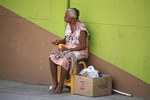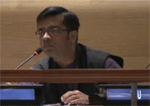Published on Sun, 2013-10-06 23:00
With no haste, but without pause, the participation of women in the labour market has seen accelerated growth since the 1970s, according to the Panorama Laboral 2012 of the International Labour Organization (ILO). There is a gradual closing of the differences in participation between men and women in the labour force. The participation rate of women in Latin America in 2012 was 49.8%, the employment rate was 40.2% and the unemployment rate 7.7%, while for men the participation rate was 71.4%, employment 59.8% and unemployment 5.6% |
Published on Thu, 2013-10-03 18:55
The event "From aspiration to action: A Human Rights Framework for the post-2015 Agenda" took place on September 25, 2013 at the United Nations in New York, with participation from the Tunisian Minister for Social Development, Mr Khalil Zaouia; Ms. Patrizianna Sparacino, French Ambassador for Human Rights; Mr. Ivan Šimonović, Assistant Secretary-General for Human Rights, OHCHR; Ms. Saraswathi Menon, Director of Policy Division, UN Women and Roberto Bissio, from Social Watch. Social Watch coordinator, Roberto Bissio, "Humans have rights and they are inalienable, corporations have privileges and those are revocable." To see his participation on the debate click here. |
Published on Thu, 2013-10-03 14:55
Speaking at the UN General Assembly articulating the Indian civil society aspirations on actions to make the new development agenda work in developing nations that are home to 85 percent of the world's poor, Amitabh Behar representing National Social Watch (India) and Wada Na Todo Abhiyan emphasized that, “for the new development agenda to succeed, we need to move away from a poverty lens to a more holistic justice frame.” The new development frame will succeed the current Millennium Development Goals (MDGs) that expire in 2015. Mr. Amitabh Behar, a representative of a coalition of 4,000 Indian civil society organisations under the umbrella National Social Watch and Wada Na Todo Abhiyan, voiced the civil society concerns related to the new development agenda at the UN Special Event on MDGs at the 68th General Assembly in New York on September 25. |
Published on Wed, 2013-10-02 18:42
Over 1,000 representatives from civil society, governments and the United Nations gathered on 22 September at UN Headquarters in New York for an open dialogue on critical regional issues and policy recommendations looking forward to the next global development agenda. “Advancing Regional Recommendations on the Post-2015 Development Agenda,” organized by the UN Non-Governmental Liaison Service (UN-NGLS) in partnership with the Post-2015 Development Planning Team of the Executive Office of the Secretary-General (EOSG), launched the report of the UN-NGLS regional civil society consultations carried out from May through August 2013. The event convened the largest single gathering of civil society in the post-2015 process to date. |
Published on Wed, 2013-10-02 14:34
UN-NGLS launched the publication of its report "Advancing Regional Recommendations for the Post-2015 Development Agenda," the synthesis of a four-month consultation conducted in writing and via teleconferences with 120 regional civil society networks. The report can be downloaded here [pdf]. |
SUSCRIBE TO OUR NEWSLETTER







